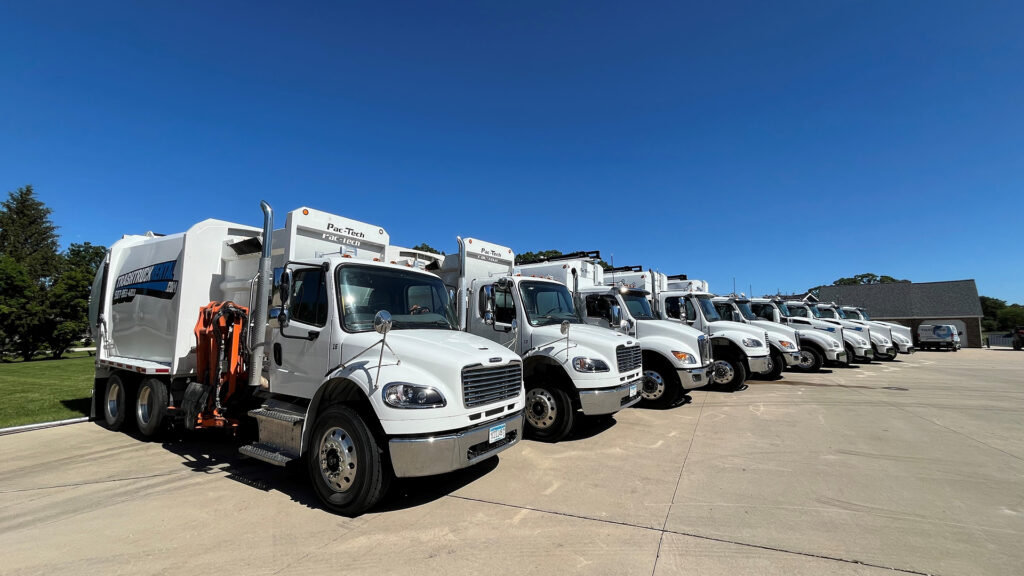Residential trash hauling is a critical service that impacts communities daily. However, today’s customers expect more than just on-time pickups. They want services they can trust, with clear communication and sustainable waste solutions. For waste management companies, especially those renting advanced trucks in the Midwest, meeting these expectations requires proactive customer engagement.
Improving customer engagement is essential. It builds trust, reduces customer churn, and boosts operational efficiency. This blog outlines strategies to enhance engagement, helping companies turn routine hauling into valued partnerships.
Understanding Modern Customer Expectations
Customers no longer see trash hauling as a simple transaction. They want a partner who listens and delivers transparency and sustainability.
- Transparency in pricing: Customers want clear, upfront costs without surprises.
- Predictable schedules: Reliable and consistent pickup times help customers plan more effectively.
- Eco-friendly options: Many households prefer services that support recycling and composting.
These expectations make it necessary for companies to move beyond one-off services and build ongoing relationships through honesty and shared environmental values.
Key Drivers of Engagement Today
Customer engagement in residential trash hauling is shaped by three critical factors: transparency, sustainability, and responsiveness. Each plays a unique role in building trust and loyalty with customers.
- Transparency
Clear, honest communication about pricing and schedules is fundamental. When customers know exactly what they will pay and when their trash will be picked up, they experience fewer surprises and frustrations. For example:
- Clear pricing: Itemized bills with straightforward descriptions (such as “collection fee” or “recycling surcharge”) reduce billing confusion.
- Proactive updates: Informing customers about any schedule changes or delays before they happen shows respect for their time and allows them to plan accordingly.
- Usage data sharing: Showing customers how much they generate and recycle fosters awareness and trust by linking pricing to actual service use.
This transparency reduces customer anxiety and builds a reputation for reliability and fairness. It transforms the relationship from a faceless transaction into a trusted partnership.
- Sustainability
Eco-conscious customers are increasingly seeking waste haulers that prioritize environmental responsibility. Incorporating sustainable practices into service offerings creates a significant competitive advantage:
- Eco-friendly disposal: Using methods that reduce landfill waste and environmental harm builds credibility.
- Recycling and composting programs: Providing clear options and add-ons helps customers participate in waste reduction easily.
- Transparency about impact: Sharing reports or statistics about waste diverted from landfills demonstrates accountability and reinforces a shared commitment to sustainability.
This focus not only meets growing customer expectations but also positions the company as a responsible community partner.
- Responsiveness
Prompt, attentive customer service is essential:
- Quick issue resolution: Customers feel valued when their problems receive fast responses and practical solutions.
- Follow-ups: After resolving a concern, following up to confirm customer satisfaction strengthens trust and shows genuine care.
- Multi-channel support: Offering different ways to communicate (phone, email, chat) ensures customers can reach help conveniently.
Responsiveness turns potential frustrations into opportunities for positive engagement, deepening customer connections.
By prioritizing these key drivers, transparency, sustainability, and responsiveness, waste hauling companies create a customer-centered service culture. This leads to higher satisfaction, better compliance with waste guidelines, and long-lasting relationships.
Leveraging Digital Convenience
Customers expect easy, on-demand control over their trash hauling services. Digital self-service through mobile-friendly portals meets this need by offering 24/7 access without waiting for calls or emails.
Key features include:
- Scheduling or rescheduling pickups anytime on phones or tablets
- Quickly reporting issues like missed pickups or damaged bins
- Updating contact details and service preferences instantly
Online payment options simplify billing:
- View and pay invoices securely at any time
- Choose payment methods like credit cards or ACH
- Set up automatic payments to avoid late fees
Automated SMS and email reminders reduce missed pickups and billing confusion.
Together, these digital tools empower customers with transparency and convenience while lowering support costs and operational friction for waste companies.
Smart Technology in Trash Services
Technology is transforming the customer experience in residential trash hauling by enhancing transparency and responsiveness.
- GPS-enabled route tracking allows customers to track trucks in real time, which reduces uncertainty. They no longer have to wonder when the truck will arrive, improving convenience on pickup days.
- Real-time pickup notifications alert customers as trucks approach their location or inform them swiftly if delays occur. These timely updates set realistic expectations and respect customers’ time.
- AI chatbots offer instant, 24/7 customer support for common inquiries, such as schedule changes, billing questions, or reporting missed pickups. This continuous accessibility improves response time and frees human agents to address more complex issues.
- Integrating these smart technologies signals a company’s commitment to modern, efficient service. Customers feel supported and informed throughout the haul process, building trust and loyalty.
Together with flexible rental options of advanced garbage trucks, these technological tools position waste companies as leaders in responsive, customer-friendly service.
Building Trust Through Sustainability
Sustainability plays a crucial role in building trust with customers and setting waste hauling services apart in a competitive market. Customers today increasingly expect companies to demonstrate genuine environmental responsibility. Meeting this expectation not only enhances brand reputation but also nurtures long-term relationships.
Why Sustainability Builds Trust
- Demonstrates corporate responsibility: When companies prioritize eco-friendly disposal methods, customers see them as ethical and forward-thinking partners.
- Aligns with customer values: Many households actively seek services that help reduce their environmental footprint. Recognizing this strengthens emotional connections.
- Differentiates service: Sustainability programs stand out as value-added features in a business where services can otherwise appear commoditized.
Practical Ways to Build Trust with Sustainability
- Emphasize environmentally responsible disposal: Use and openly communicate about methods such as waste sorting, recycling, and landfill diversion to show commitment.
- Offer recycling and composting add-ons: By providing easy options customers can opt into, companies help individuals reduce their impact without complicating service.
- Publish transparent sustainability reports: Sharing landfill diversion rates, carbon footprint reductions, and progress on environmental goals fosters transparency and accountability.
Companies that integrate these practices convey care beyond compliance and financial motives, which resonates deeply with customers who want their choices to reflect their values.
Educating Customers on Waste Impact
Engaged customers are informed customers. When customers understand how their actions affect waste management and the environment, they participate more effectively, improving compliance and overall service success.
Benefits of Educating Customers
- Improves compliance: Proper sorting and disposal reduce contamination and inefficiencies, making pickups smoother and more cost-effective.
- Empowers customers: Knowledgeable clients feel confident contributing positively to sustainability goals.
- Builds community champions: Educated customers often become advocates who spread awareness and encourage others to adopt better waste habits.
How to Educate Effectively
- Share clear, practical waste segregation tips: Break down simple actions customers can take at home to reduce contamination and recycle properly.
- Promote participation in community initiatives: Encourage customers to join local recycling drives, composting workshops, or neighborhood clean-ups to reinforce community engagement.
- Use regular educational outreach: Deliver newsletters, social media posts, or flyers that highlight seasonal tips, new programs, or innovations to keep waste reduction top of mind.
By fostering education, companies not only improve operational efficiency but also cultivate a loyal, informed customer base invested in shared environmental goals.
Personalizing Service Experience
In a market where basic trash pickup is standard, personalizing service helps companies stand out and build loyalty.
Why Personalization Matters
- Customers have diverse household sizes, waste volumes, and schedules.
- Flexible service shows respect for these differences.
- Tailored experiences create emotional connections and encourage long-term retention.
Ways to Personalize Service
- Flexible Pickup Options: Allow weekly, biweekly, or seasonal pickups and extra services during holidays or yard work seasons for convenience and cost savings.
- Loyalty Rewards: Offer discounts, free bulk pickups, or early access to specials to reward repeat customers.
- Data-Driven Recommendations: Use customer waste patterns to suggest relevant add-ons like recycling bins or composting services.
Personalization makes customers feel valued, turning one-time users into loyal partners.
Customer-Centric Loyalty Programs
Rewarding positive customer behaviors further boosts engagement and advocacy.
- Recycling-Based Discounts: Encourage eco-friendly habits by offering reduced rates to customers who participate actively in recycling or composting programs.
- Tiered Loyalty Levels: Create reward tiers (bronze, silver, gold) based on contract length, waste volume, or environmental impact, providing escalating benefits like priority scheduling or added services.
- Referral Incentives: Implement programs offering credits or discounts to customers who successfully refer new clients. Referrals bolster trust, as new customers are more likely to join based on personal recommendations.
These programs link rewards to sustainable actions and loyalty, motivating customers to remain engaged and advocate for the service.
Strengthening Communication Channels
Clear and respectful communication reinforces trust and reduces dissatisfaction.
- Proactive Updates: SMS or email alerts inform customers of upcoming pickups, schedule changes, or special promotions, reducing surprises and frustration.
- Empathetic Complaint Handling: Respond swiftly and compassionately to issues, apologizing when service falls short and offering solutions like free pickups or discounts to regain goodwill.
- Multi-Channel Access: Offer various contact options such as phone, email, and live chat, allowing customers to choose their preferred communication method for convenience.
Maintaining open, considerate dialogue enhances brand reputation and customer loyalty by making clients feel heard and supported.
Community Engagement Initiatives
Local involvement strengthens community ties and builds a positive brand image.
- Sponsor Clean-Up Events: Actively participate or organize neighborhood cleanup days, demonstrating company commitment to community well-being.
- Partner on Eco-Campaigns: Join forces with local businesses and organizations to promote recycling, composting, and sustainability awareness.
- Highlight Community Efforts: Showcase participation in local initiatives through marketing materials and social media, creating pride and trust among residents.
Customers value companies that invest in their communities, often rewarding such engagement with loyalty and positive word-of-mouth.
Conclusion
Residential trash hauling is now a relationship-driven service. Companies that focus on transparency, sustainability, digital convenience, and personalized care will excel. For waste businesses renting advanced trucks in the Midwest, these strategies build lasting trust and operational success.Partnering with experts like Trash Truck Rental ensures access to reliable, well-maintained equipment that supports efficient and consistent service. Together, they help transform trash hauling from a routine chore into a trusted community partnership, fostering satisfaction for customers and growth for businesses.



